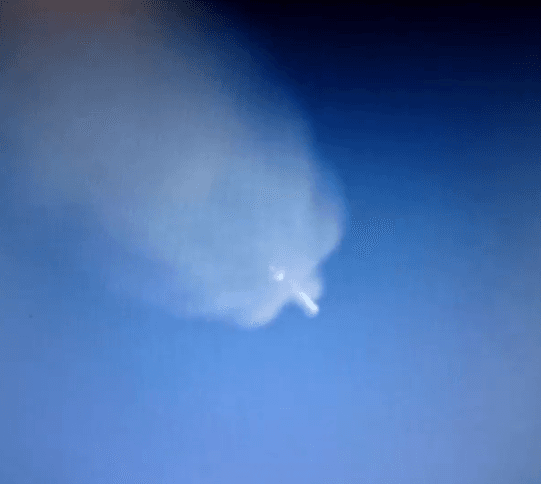Screenshot of SpaceX rocket breakup shortly after launch on Sunday morning.
NASA suffered its third resupply failure in seven months when a SpaceX rocket headed to the International Space Station apparently blew up about two minutes after liftoff in Florida on Sunday morning.
There were no astronauts on board.
Stunned space observers watched the breakup live on NASA TV, and this video captures it beginning at the 3:21 mark. The SpaceX narration goes silent, and within 10 seconds the rocket is gone, about 27 miles above the Earth.
oembed://https%3A//www.youtube.com/watch%3Fv%3DPuNymhcTtSQ
This is what it looked like in stages:
NASA is investigating the breakup. SpaceX Founder Elon Musk tweated it was caused by an “overpressure event in the upper stage liquid oxygen tank,” but in a press conference Sunday afternoon the company’s president and CEO, Gwynne Shotwell, said it was too early to say anything definitive
“This is a tough business.. we must find the source of failure and we must fix it,” she said.
The Falcon 9 resupply rocket had been carrying more than 4,300 pounds of food and supplies to the station, where American astronaut Scott Kelly, one of three spacemen aboard the space station for a year, witnessed the explosion.
NASA said the space station astronauts should have sufficient food and water supplies without this resupply, as Russia is sending another resupply rocket on July 3. Nonetheless, the explosion raises questions about NASA's ability to rely upon private companies to fulfill critical mission needs. This year, two other rockets, neither from SpaceX, also failed in attempts to resupply the station.
In April, a Russian rocket carrying a resupply ship failed as it reached orbit. In November, an Antares rocket made by the Orbital Sciences Corporation carrying a cargo ship blew up shortly after it launched from the eastern shore of Virginia. Replacement supplies for those failed efforts were among the haul in today's flight, as was the first docking port designed for future commercial crew capsules.
“We always expected to lose some vehicles, having three of them so close together is not something we would have hoped for," said Michael Suffredini, the manager of NASA’s Space Station Program Office, during the press conference Sunday.
PRI's Jared Goyette also contributed to this report.
We want to hear your feedback so we can keep improving our website, theworld.org. Please fill out this quick survey and let us know your thoughts (your answers will be anonymous). Thanks for your time!
